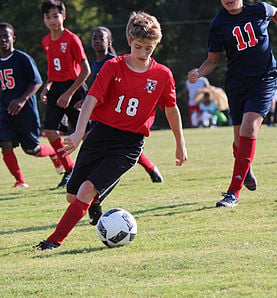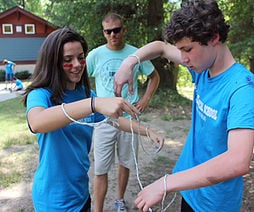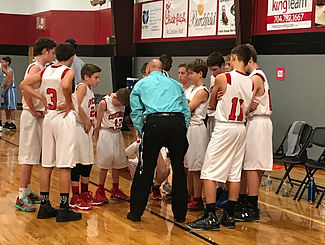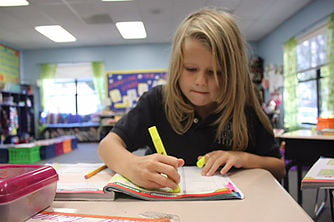It’s down to the two minutes. The score is tied, 1:1. The team captain glances to the sidelines to get instructions. Suddenly, the coach races onto the field, pushes the captain out of the way, and takes control of the soccer ball. The coach does some fancy footwork to breeze past the opponent’s defense, and not surprisingly, he scores. The fans hardly jump for joy; in fact, they look with disdain on the coach’s impulsive actions.

This kind of behavior is obviously wrong on the soccer field. Everyone knows the coach and the team work best when the coach stays in his rightful place: off the field. The same thing can be said in a family. Parents are, in essence, coaches whose goal is to have their children learn how to make mature decisions in life and to recover gracefully when they don’t. That being said, parents who step in too quickly to fix things for their child hinder the child’s progress toward maturity. In other words, parents can actually prohibit development if they are too swift to help solve the child’s problems. Does this seem like a paradox? It is!
Parents can actually prohibit development if they are too swift to help solve the child’s problems.
One of the hardest things for me as a parent has been to allow my children to face adversity. It totally goes against the grain of my role as a mother. After all, am I not supposed to support them, help them, nurture them? So how can “doing nothing” while they endure hardship be a good thing?
Here’s the dilemma: children who come to rely on their parents to fix things become dependent upon them, thus negating the development into independent adults. Moreover, if a child expects help, s/he loses an opportunity to learn problem-solving techniques, however hard these might be. Let’s face it, LIFE IS HARD! Our job as parents or teachers is not to make it less so because #1) we can’t, and #2) they will be ill-prepared when they are out on their own.
Therefore, it benefits them if we do less stepping in and do more “coaching from the sidelines.”
You see, our kids are like the players on the field. We parents can “send in plays” from the sidelines, even make hand signals as they look over to us from the line of scrimmage. But remember, a coach’s place is off the field.
What does this look in real life situations? How do you recognize the difference between “running on the field” and coaching?”
“Running on the field" looks like this:
"Bring me your math; I'll check over your work."
“That kid said WHAT? I’m going to call his parent right now.”
and the most famous: “Time to get up.” “I said . . .” (repeat ad nauseum)
Coaching looks like this:
"Troubles with math? What are your options?”
"That kid said WHAT? Whoa, how did you feel about that?"
“Overslept again? Yikes. No, I will not write an excuse note. What’s your plan for solving this? (discussion) Hmm, do you think that is a realistic step for you?" “By the way, you owe 50 cents in the piggy bank every time you cause your sibling to be tardy.”
Getting an early handle on responsibilities will actually promote better academic habits.
Students will accept that they, and not their parents, are responsible for their grades. Coaching from the sidelines helps tremendously in this.

Parents who empathize rather than fix will say things like:
"Rotten grade. Yuck. I hate that for you." (and then leave it alone)
"Uh oh, you got a demerit. What happened?"
"Had a bad partner? Rats. What do you think you could have done differently to have a better outcome?"
This may be uncomfortable for both parent and student. No child likes when Mom and Dad back out, and I don’t want to imply this is easy to do. I have seen many a child (even an adult child) fume and fuss when the paradigm shifts for them. Becoming responsible for one’s own behavior/actions/attitude/outcomes is as attractive as the having the Plague! But, honestly, how else can we move them into adulthood?
Now, it doesn’t have to be all in one fell swoop. In sports, much of the work is done in incremental steps. Likewise, in the game of life, these measures should be gradual and age-appropriate, yet deliberate. For example, 1st graders need side-by-side reading homework. 3rd graders should be able to accomplish their homework independently, then show end results to parents. 5th graders should get it done, checked off their assignment pad, and packed in their bookbags. Middle schoolers should have homework done, packed, lunch made, and have the car started to warm it up. (Am I moving too fast for you, parents?!)

The bottom line is kids will feel and act like champions when they solve a dilemma for themselves.
Long range benefits to the parents include:
1) being released from undue stress and anxiety (after the initial angst of the process subsides)
2) being filled with pride that comes from watching a maturing son or daughter, little by little, shoulder their own responsibilities.
In closing: it’s best to coach children to solve their own problems. As hard as it is to watch them stumble and fumble, discomfort turns out to be a great teacher. It is the BEST lesson learned--one that will develop into full maturity and dependence on God in the future.


